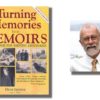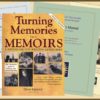In this Strategies for Successful Writing category, you will read about processes and props you can implement to increase your success as a memoir writer.
While it would be comforting to think that “wanting to succeed” would be sufficient for success, it simply is not. Nor are best efforts, enthusiasm, and working hard.
You must master the craft—that is, the craft of memoir writing. Success for a memoirist is indexed both on the writer’s experience of best writing practices and ability to access feelings deep inside as well as on the reader’s experience. (The reader after all has to bring much to the story experience.) You don’t however have much control of the reader’s response, but you do of your writing.
Best Practices of Strategies for Successful Writing
As in all professions and trades, there are “best practices” for memoir writing that facilitate and improve your writing experience and your audience’s reading experience.
While no one would contradict that memoir writing is an art and requires intuition and sensibility, it is also a craft that relies on best practices of successful memoir writing.
In conclusion
The posts below will help you to write better narratives. But, don’t stop there. Read your way through the entire Memoir Writer’s Bog. Be sure to read How to write a memoir: our 21 Best Memoir-Writing Tips to get you writing your memoir—quickly and well—and getting it into the hands of your public.
As one of the most fundamental strategies for successful writing, let’s be sure to emphasize that when writers do not complete their memoir, they cannot be called successful. So…keep writing until you finish.
Good luck with your writing.

Four Tips for Writing a Better Memoir
To write a better memoir, make use of the core memory list. The extended memory list does not make value judgments about the quality of your memories. The core memory list, however, distinguishes between two sorts of memories— the important from the unimportant.

Telling the Truth About your Life
In a world where we are constantly being bombarded with subtle—and not so subtle—messages about who we ought to be, it is a bold statement to take a stand for personal truth and authenticity.
The telling of your stories is a revolutionary act.
—Sam Keen, Writer
One of the most transformative statements an individual can make is to tell his/her story with honesty and objectivity. At its best, this is what a memoir is—a statement that declares “this is who I am, who I think of myself as being.”
Lest you think that telling the truth is only about revealing scandals and unmasking abuses, let me assure you that it is more often about smaller issues, issues more within the realm of the everyday experience. [Free Membership required to read more. See below. ]
We'd love to have you access this content. It's in our members-only area, but you're in luck: becoming a member is easy and it's free.
Already a Member?
Not a Member Yet?

Is It a Memoir or Autobiographical Fiction ?
What Makes It Memoir or Autobiographical Fiction?
I read a memoir that did well here in Maine (it’s by an excellent Maine writer)—I can’t vouch for its reach in the rest of the country. I’m left wondering whether the author was writing memoir or autobiographical fiction.
It’s an interesting book, very well-written in terms of style and organization, but my nagging doubt is that it is autobiographical fiction and not memoir. I will choose to leave the book nameless as my intent is not to be negative about it but only to use it to elucidate a point about memoir writing which I think is important to keep in mind as we write.
I have frequently spoken about using fiction techniques to make a memoir more interesting. Dialog, for instance, can be marvelous. The trick, as I have offered frequently, is to use only a few words in direct dialog (“I won’t,” she said) and then put the rest in indirect dialog (She said that was because blah, blah, blah…)
Fiction Techniques in a Memoir
[Free Membership required to read more. See below. ]
We'd love to have you access this content. It's in our members-only area, but you're in luck: becoming a member is easy and it's free.
Already a Member?
Not a Member Yet?

Don’t Talk Your Stories Away
Don’t Talk Your Stories Away
When a writer talks too much and too revealingly about a work-in-progress—especially at the early stage before the writing has taken shape—the energy to get the story written is often scattered. Sometimes what passes for a writer’s block is only a failure to relate to your stories in a way that’s conducive to getting them written. This may seem like a writer’s block but it’s not. It’s really poor writing discipline!
People have an urge to make their stories public—in any format that will satisfy the impulse. Talking over a cup of tea may be just as satisfying a release as shaping a memorable poem or novel or life story.
[Free Membership required to read more. See below. ]
We'd love to have you access this content. It's in our members-only area, but you're in luck: becoming a member is easy and it's free.
Already a Member?
Not a Member Yet?

Is this really a memoir? You tell me…
I wrote a lengthy reply to Gayle to her question concerning my recent post, “Another Memoir Finished: What Was the Writing Process?” She asked a legitimate question about whether A Sugary Frosting is really a memoir: “Can you call it a memoir when you embellish the writings of your wife and even added stories that […]

Telling The Truth In A Memoir
“If you call a book a memoir, the understanding is that to the best of your knowledge the facts, and what can be verifiable, are the truth. …”

How to Write a Memoir – An Interview with Libby Atwater, Part 1
Here’s a recent discussion we had with Libby Atwater who began telling people’s stories professionally after a career in education. As a writer and editor, she has worked for individuals, families, businesses, nonprofits, universities, and community newspapers. Tales from her life have been published in several anthologies. Her memoir What Lies Within covers her first […]

How to Write a Memoir – An Interview with Libby Atwater, Part 2
Here’s the second half of my recent discussion with Libby Atwater who began telling people’s stories professionally after a career in education. As a writer and editor, she has worked for individuals, families, businesses, nonprofits, universities, and community newspapers. Tales from her life have been published in several anthologies. Her memoir What Lies Within covers […]

How Many Memoir Types Are There?
There used to be one and not several memoir types.
The one kind of memoir genre was that written by famous people about the important events in history that they had taken part in. Mostly, these accounts were about how wonderful they were and how important their roles in history had been. Oftentimes, these memoirs were about excoriating their political or business rivals and actually provided little emotional or psychological insight into the protagonist other than s/he was a “good guy.”
More
Today, we have more kinds of memoir types—or genres—than we could have imagined even only several generations ago. The Memoir Writer’s Blog has a whole category devoted to types of memoir,
[Free Membership required to read more. See below. ]
